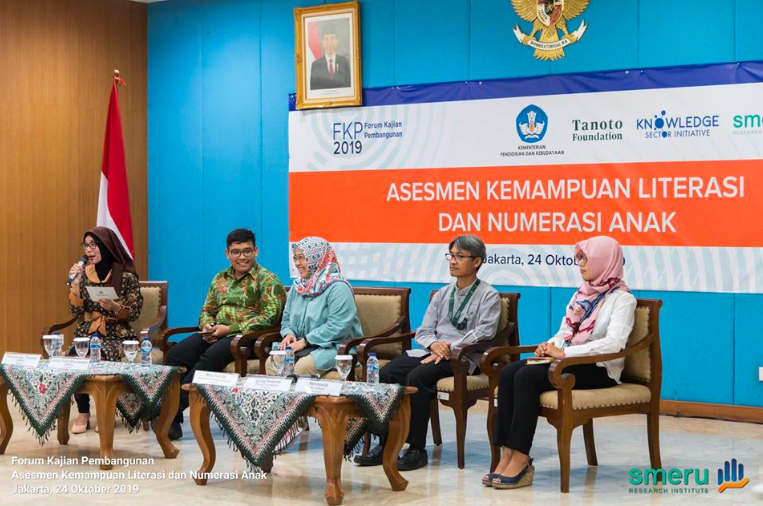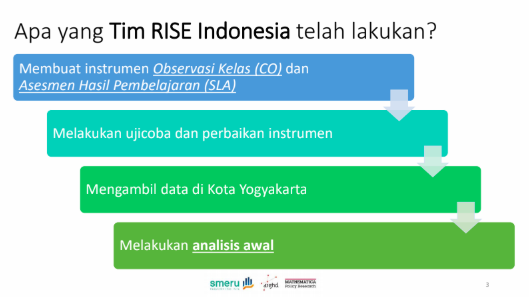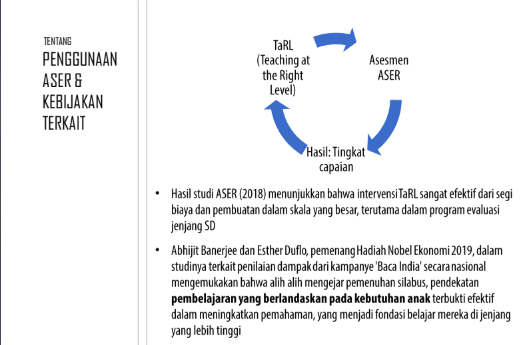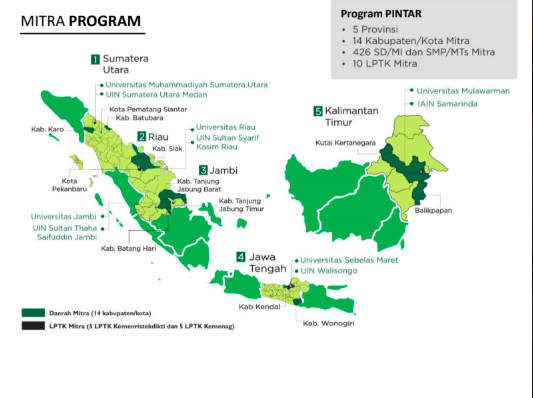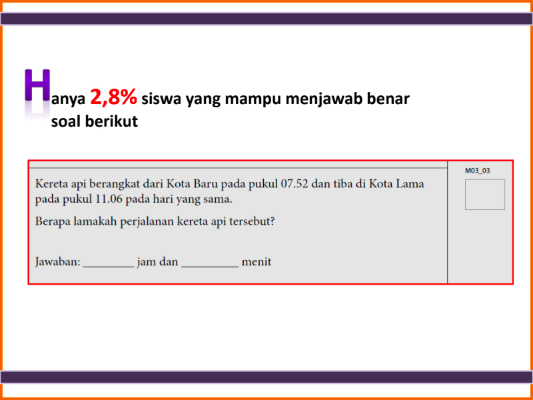Assessment is an integral part of a learning process, not only to measure students’ learning outcomes but also to evaluate the quality of teachers and the effectiveness of the education system. On Thursday, 24 October 2019, the SMERU Research Institute hosted an FKP seminar at the Ministry of Education and Culture, which discussed the importance of learning assessments and the various forms that take. The speakers were Goldy Fariz Dharmawan (The SMERU Research Institute), Nisa Felicia (Peneliti dari Pusat Studi Pendidikan dan Kebijakan or PSPK), Ujang Sukandi (Tanoto Foundation), and Rahmawati (Ministry of Education and Culture, Republic of Indonesia).
Goldy Fariz Dharmawan shared a study conducted by researchers at The SMERU Research Institute on in-class learning process. Education in schools is often assessed from the input (teachers’ education, school accreditation, curriculum) and output (national examination), thus overlooking the process of in-class learning. The RISE team conducted a study through class observations, learning outcomes assessment, and conducting pilots and improvements of instruments in 46 junior high schools in Yogyakarta. In many of the classes observed, teachers do not interact with the students for almost half an hour of study. When teachers and students do interact, the interaction is mainly one-way and teacher-centered. In regard to the learning outcomes, the study found that students with low initial ability experience greater improvements than students with high initial ability. This shows that teachers are still unable to facilitate classes with diverse abilities.
Nisa Felicia continued the theme with a presentation about PEMANTIK, which is a community-based education assessment instrument for numeracy and literacy that was developed by Pratham in India. This instrument can be conducted by anyone and to any child aged 4-16 regardless of whether or not they are in school. Aside from the numerical and literacy questions, this instrument is also complemented with demographic questions that can enrich analysis of the data. In the future, PSPK will also develop materials for Teaching at the Right Level.
Next, Ujang Sukandi shared the results of Early Grade Reading Assessment (EGRA) and Early Grade Mathematics Assessment (EGMA) that was conducted by The Tanoto Foundation for their PINTAR program. The assessments were conducted in 5 provinces in Indonesia using the Computer Assisted Personal Interview (CAPI) approach. Out of the regions studied, East Kalimantan has the higher achievement in reading fluency and reading comprehension. As for mathematical skills, the assessment found that students show lower performance in subtraction questions that include regrouping/borrowing than questions about number patterns and word problems. Students also answer “traditional” word problems relatively easily, but once the problem is modified, fewer students are able to answer.
Lastly, Rahmawati shared about the challenges of implementing higher order thinking skills (HOTS) in school assessments. Since 2014, the Ministry of Education and Culture has included aspects of HOTS into the national examination through non-routine questions in order to challenge students’ critical thinking skills. As an example, a question asks students to figure out the possible password combination from an array of figures. By doing this, previously learned concepts are reintroduced to students in a renewed context. However, previous national examinations show that a very small percentage of students are able to answer these kinds of questions. Additionally, teachers’ ability to make these questions is also limited. As a solution, the Ministry of Education and Culture invited teachers from all around Indonesia to participate in a training for higher order thinking skills. After the training, teachers show an improvement in formulating questions that require higher order thinking skills. Rahmawati also encourages more resources of HOTS for teachers, not only in the form of technical trainings but also collaborative learning forums between teachers.
For the complete presentation and Q&A session, please refer to the video and materials provided.
